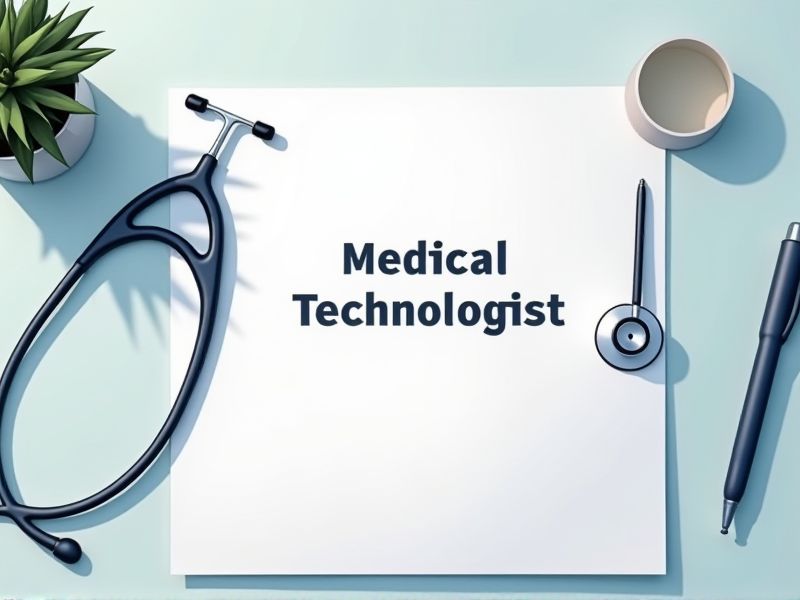
Medical Technologists play a crucial role in healthcare by conducting vital lab tests essential for patient diagnosis and treatment. Certifications ensure these professionals possess the required knowledge and skills, maintaining high standards of accuracy and reliability in lab results. They often cover specialized areas, equipping technologists to handle advanced laboratory equipment and adhere to safety protocols. Key certifications may be necessary for Medical Technologists.
ASCP Board of Certification in Medical Laboratory Science (MLS)
The ASCP Board of Certification ensures that medical technologists demonstrate the necessary competency and skills, leading to improved patient outcomes. This certification is often required by employers, as it establishes a standardized measure of expertise and professionalism in the field. Holding the ASCP MLS certification can enhance career opportunities, as many healthcare facilities prefer or require it for hiring and advancement. Certification from a recognized body like ASCP can also increase confidence in lab results, fostering trust among healthcare teams and patients.
AMT Certification for Medical Laboratory Scientists
Obtaining AMT Certification for Medical Laboratory Scientists ensures that professionals have met standardized competencies in medical technology skills. This certification serves as a validation of expertise, increasing employer trust and job prospects within the healthcare sector. The certification process requires continuing education, keeping technologists updated with advancements in laboratory methodologies and technologies. Healthcare facilities often require such certification to maintain accreditation standards, enhancing the overall quality of patient care.
AAB Certification for Medical Laboratory Scientists
AAB Certification for Medical Laboratory Scientists is essential because it sets a standardized benchmark for assessing the competence of professionals in the field. This certification enhances the credibility of medical technologists, leading to improved trust among healthcare providers and patients. With certification, medical technologists are better equipped to stay current with advances in laboratory techniques and technologies, ensuring high-quality patient care. Certified professionals often have access to better career opportunities and advancements due to recognition of their validated expertise.
National Credentialing Agency for Laboratory Personnel (NCA) Certification
The National Credentialing Agency for Laboratory Personnel (NCA) Certification ensures standardized competence among medical technologists, promoting public trust and safety in healthcare. This certification verifies that the technologist has met rigorous education and clinical training standards, essential for accurate and reliable laboratory diagnoses. Hospitals and laboratories often require this certification as a hiring criterion, enhancing job prospects for certified individuals. NCA-certified technologists demonstrate ongoing professional development and commitment to the latest practices in laboratory science, crucial for maintaining high standards in an ever-evolving medical field.
ASCP Specialist in Blood Banking (SBB) Certification
Obtaining the ASCP Specialist in Blood Banking (SBB) Certification equips medical technologists with advanced knowledge in immunohematology. This certification enhances their ability to manage complex blood banking procedures and resolve compatibility issues. It also increases job prospects and potential for career advancement in specialized laboratory environments. Furthermore, holding an SBB Certification can lead to higher salary prospects due to the specialized skills and expertise recognized in the field.
ASCP Specialist in Microbiology Certification
Achieving the ASCP Specialist in Microbiology Certification often leads to career advancement, as it signifies a higher level of expertise in microbiology. Medical technologists with this certification typically gain a competitive edge in hiring processes, given the credential's recognition by employers. The certification can result in increased job responsibilities, fostering professional growth and expertise in specialized microbiological areas. It also aligns with compliance standards and regulations, ensuring high-quality and accurate laboratory results critical in diagnosing infectious diseases.
AACC Certification in Clinical Chemistry
AACC Certification in Clinical Chemistry can enhance a medical technologist's knowledge and expertise in biochemical analysis, leading to more accurate patient diagnoses. As healthcare standards evolve, certification demonstrates a commitment to professional development and adherence to updated industry protocols. Certified technologists might experience increased career opportunities and job security, due to the trust and recognition the certification conveys. Furthermore, with certification, technologists are likely to contribute to improved patient outcomes through the application of advanced methodologies and technologies in clinical settings.
Association for Molecular Pathology (AMP) Certification in Molecular Diagnostics
The AMP Certification in Molecular Diagnostics sets a recognized standard of competency for medical technologists, enhancing their expertise in molecular pathology. It ensures technologists are well-versed in the latest techniques and technologies within the rapidly evolving field, improving diagnostic accuracy. Certification can lead to increased professional credibility, potentially expanding career opportunities and advancement. Hospitals and laboratories may prefer or require certified staff to ensure high-quality patient care and compliance with industry standards.
Certified Phlebotomy Technician (CPT) Certification
Certified Phlebotomy Technician (CPT) certification enhances a medical technologist's skills in sample collection. Accreditation ensures compliance with industry standards and improves patient safety. Employers often seek certification as a benchmark for competence and credibility. Certification can lead to better job opportunities and higher salaries within healthcare facilities.
Certified Laboratory Quality Improvement Associate (CLQIA) Certification
The Certified Laboratory Quality Improvement Associate (CLQIA) Certification equips medical technologists with skills that enhance laboratory process efficiency, leading to improved patient care. It emphasizes problem-solving techniques, which effectively reduce errors in diagnostic procedures. Knowledge from this certification aligns laboratory operations with industry standards, increasing regulatory compliance. As healthcare demands grow, having the CLQIA designation provides medical technologists a competitive edge in their career advancement.
Summary
By obtaining additional certifications, you can enhance your expertise in specialized areas of medical technology, leading to increased job prospects and potential salary growth. Your certification can instill greater trust from both employers and patients, as it indicates a higher standard of competency. You may also find opportunities for career advancement more accessible, with some positions requiring specialized qualifications. Ultimately, your professional reputation can improve, often resulting in a more fulfilling career trajectory.
